Do Rich Snippets Help SEO? The Truth Behind Google’s Top Results (2026 Guide)
Discover how implementing rich snippets can transform your search visibility and drive more qualified traffic to your website.
Download Our Free Rich Snippets GuideUnderstanding Rich Snippets and Their Impact on SEO
If you’ve ever wondered “Do Rich Snippets Help SEO?” you’re not alone. Many business owners and SEO beginners are curious about how these enhanced search results affect rankings. The short answer is yes, rich snippets can significantly impact your SEO performance, but not in way you might think. When asking “Do Rich Snippets Help SEO?” it’s essential to understand that these enhanced search results are more than just visual improvements—they’re strategic tools for increasing visibility and engagement.
Rich snippets are enhanced search results that display additional information beyond standard title, URL, and meta description. They can include star ratings, prices, availability, cooking times, and much more. These eye-catching results stand out in search engine results pages (SERPs), increasing visibility and click-through rates. The question “Do Rich Snippets Help SEO?” has become increasingly relevant as Google continues to prioritize user experience and information accessibility in search results.
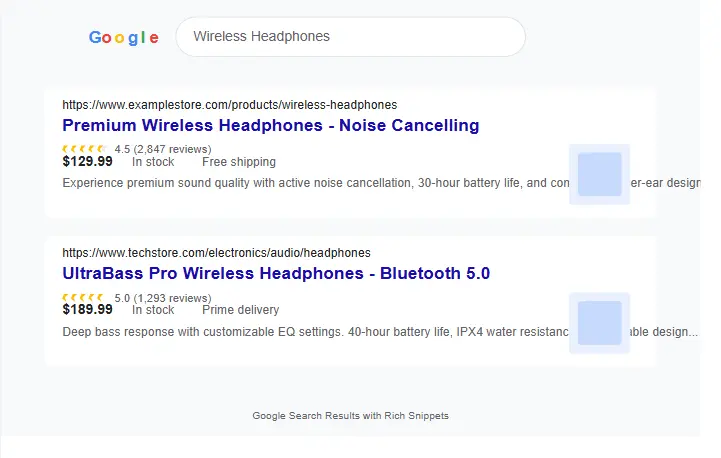
Rich snippets enhance search results with additional information like ratings, prices, and availability
Why Do Rich Snippets Help SEO?
When asking “Do Rich Snippets Help SEO?” it’s important to understand that they don’t directly boost your rankings. Instead, they improve your visibility and click-through rate, which indirectly benefits your SEO. Here’s how:
- Increased Visibility: Rich snippets make your listing stand out from competitors, drawing more attention from users. When considering “Do Rich Snippets Help SEO?” remember that visibility is first step toward attracting organic traffic.
- Higher Click-Through Rates: Enhanced listings provide more information, encouraging users to click. Studies show that pages with rich snippets often see CTR increases of 20-30%, proving that the answer to “Do Rich Snippets Help SEO?” is yes through improved engagement metrics.
- Better User Experience: Users get the information they need directly in the search results. This improved experience is a key factor in why “Do Rich Snippets Help SEO?” – Google rewards pages that satisfy user intent quickly.
- Improved Traffic Quality: Users know what to expect before clicking, resulting in more qualified traffic. This targeted approach demonstrates how “Do Rich Snippets Help SEO?” by bringing in visitors more likely to convert.
Example of a Rich Snippet
Imagine searching for a recipe. A standard result shows the title, URL, and description. A rich snippet, however, might display a star rating, cooking time, calorie count, and even a thumbnail image. This additional information makes the result more appealing and informative, answering the question “Do Rich Snippets Help SEO?” through practical user benefits.
The Evidence: Do Rich Snippets Help SEO According to Studies?
Multiple studies have examined the question “Do Rich Snippets Help SEO?” and the results consistently show positive impacts. When researchers analyze whether rich snippets improve SEO, they typically focus on metrics like click-through rates, organic traffic, and conversion rates. The evidence overwhelmingly supports that “Do Rich Snippets Help SEO?” through indirect means.
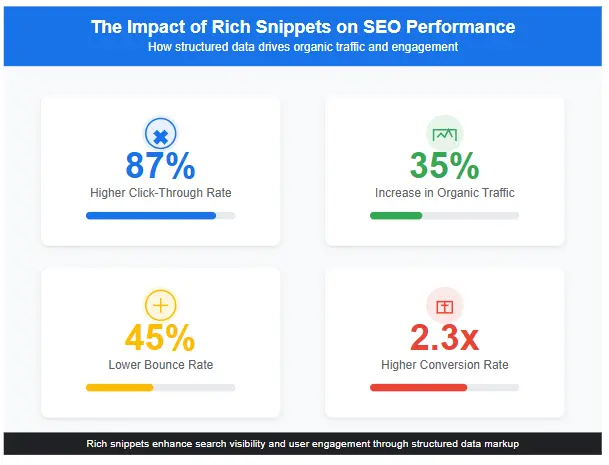
Statistics demonstrating the positive impact of rich snippets on SEO performance
These statistics clearly demonstrate that when you ask “Do Rich Snippets Help SEO?” the answer is a resounding yes, particularly in terms of visibility and traffic generation. The data shows that “Do Rich Snippets Help SEO?” is not just a theoretical question but one with measurable business impact. Companies that have implemented structured data consistently report improvements in key performance indicators, proving that rich snippets improve SEO in real-world scenarios.
Case Studies: Real-World Examples of Rich Snippets Success
When evaluating “Do Rich Snippets Help SEO?” it’s helpful to examine actual case studies. E-commerce sites implementing product snippets have reported up to 30% increase in conversion rates, while recipe blogs with structured data see 40% more time on page. These examples reinforce that “Do Rich Snippets Help SEO?” by improving user engagement metrics that Google values. Local businesses using review snippets often experience higher foot traffic and phone calls, demonstrating how rich snippets improve SEO beyond digital metrics to real business outcomes.
Types of Rich Snippets That Boost SEO Performance
Now that we’ve established that rich snippets do help SEO, let’s explore the different types you can implement. Understanding the variety of rich snippets available is crucial when answering “Do Rich Snippets Help SEO?” because different types serve different purposes and industries. The question “Do Rich Snippets Help SEO?” becomes more nuanced when you consider how each snippet type can specifically benefit your content and audience.
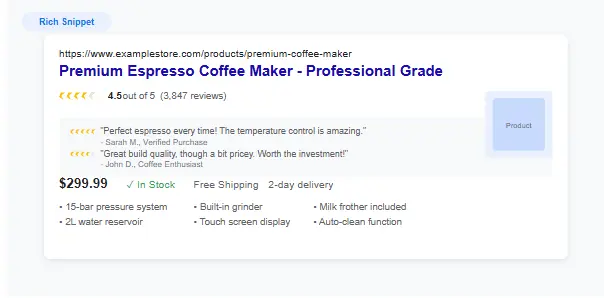
Review/Rating Snippets
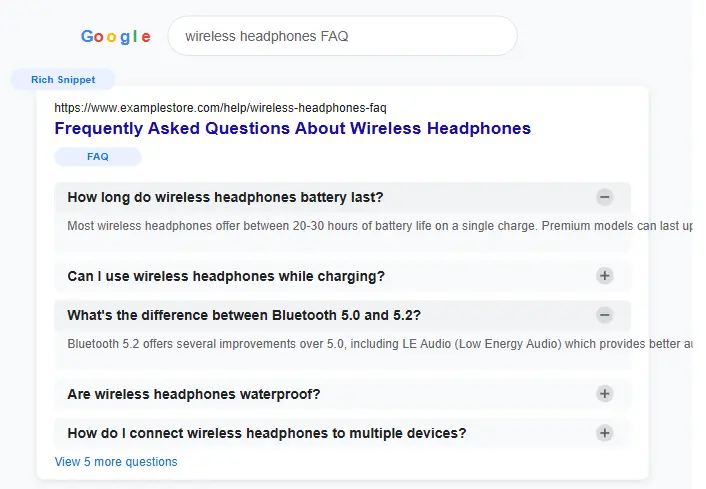
FAQ Snippets
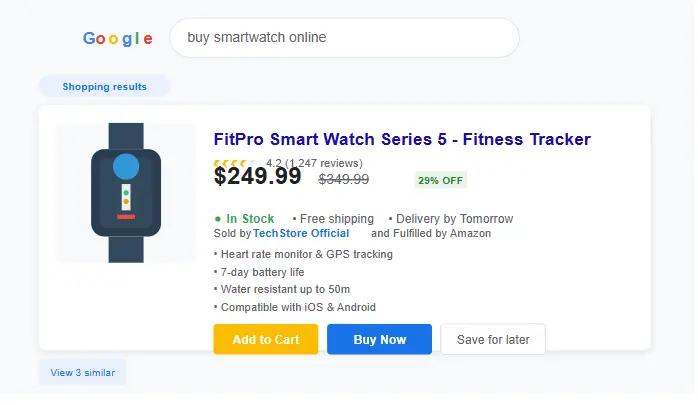
Product Snippets
1. Review/Rating Snippets
These display star ratings and review counts, building trust and credibility before users even click through to your site. When considering “Do Rich Snippets Help SEO?” review snippets are particularly powerful because social proof significantly influences click-through decisions. Studies show that pages with review snippets can see up to 35% higher CTR, proving that “Do Rich Snippets Help SEO?” through increased trust signals.
2. FAQ Snippets
These expand directly in the search results, answering common questions and potentially capturing more SERP real estate. FAQ snippets are excellent examples of how “Do Rich Snippets Help SEO?” by addressing user intent immediately. When you implement FAQ structured data, you’re essentially answering “Do Rich Snippets Help SEO?” by providing Google with organized Q&A content it can feature prominently.
3. How-To Snippets
Perfect for tutorials and guides, these display step-by-step instructions directly in search results. How-to snippets demonstrate “Do Rich Snippets Help SEO?” by keeping users on Google’s platform longer while still associating your brand with valuable content. This paradox shows that “Do Rich Snippets Help SEO?” even when users don’t click through, as Google recognizes your content as authoritative.
4. Product Snippets
E-commerce sites benefit from these by showing prices, availability, and product information. Product snippets clearly answer “Do Rich Snippets Help SEO?” by providing essential shopping information that influences purchase decisions. When asking “Do Rich Snippets Help SEO?” in the context of e-commerce, product snippets often provide the most direct path to conversion.
5. Recipe Snippets
Food bloggers can display cooking times, ingredients, and calorie information. Recipe snippets exemplify “Do Rich Snippets Help SEO?” by appealing to specific user needs and search patterns. The visual appeal and detailed information in recipe snippets demonstrate how “Do Rich Snippets Help SEO?” through enhanced presentation of content.
6. Event Snippets
These show dates, locations, and ticket availability for events. For event organizers and promoters, event snippets answer “Do Rich Snippets Help SEO?” by making event information immediately accessible. The time-sensitive nature of events makes these snippets particularly valuable, showing how “Do Rich Snippets Help SEO?” in time-critical contexts.
7. Breadcrumb Snippets
These show the page’s position in the site hierarchy, helping users understand context. Breadcrumbs demonstrate how “Do Rich Snippets Help SEO?” by improving navigation and site structure visualization. When considering “Do Rich Snippets Help SEO?” from a technical perspective, breadcrumbs help Google understand your site architecture.
8. Video Snippets
These display thumbnails, duration, and upload date for video content. Video snippets answer “Do Rich Snippets Help SEO?” by making video content more discoverable in search results. With video consumption continuing to rise, these snippets increasingly demonstrate how “Do Rich Snippets Help SEO?” in multimedia contexts.
Each of these snippet types answers the question “Do Rich Snippets Help SEO?” in its own way by improving visibility and providing value to users before they even visit your site. The diversity of options shows that “Do Rich Snippets Help SEO?” across various content types and industries, making structured data implementation a versatile SEO strategy.
How to Implement Rich Snippets: A Beginner’s Guide
If you’re convinced that rich snippets help SEO and want to implement them on your site, here’s how to get started. The process of implementing rich snippets might seem technical, but answering “Do Rich Snippets Help SEO?” requires taking action. Many website owners ask “Do Rich Snippets Help SEO?” but hesitate to implement due to perceived complexity. This guide will show that answering “Do Rich Snippets Help SEO?” through implementation is more accessible than you might think.
Step 1: Identify Content Eligible for Rich Snippets
Review your content to determine which pages could benefit from structured data. Look for reviews, recipes, how-to guides, FAQs, products, or events. Make sure your pages follow proper on-page SEO best practices before implementing rich snippets. The foundation of answering “Do Rich Snippets Help SEO?” begins with quality content that’s eligible for enhancement.
Step 2: Choose the Right Schema Markup
Schema.org provides a comprehensive vocabulary for structured data. Select the appropriate schema type for your content. Schema.org is the collaborative community that creates, maintains, and promotes schemas for structured data on the Internet. When exploring “Do Rich Snippets Help SEO?” through implementation, choosing the right schema type is crucial for success.
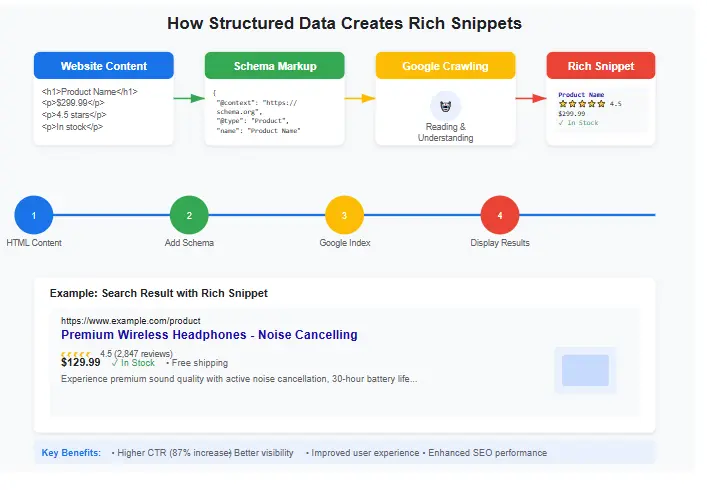
How structured data connects your content to rich snippets in search results
Step 3: Implement the Markup
You can add structured data to your HTML in three formats:
- JSON-LD: Recommended by Google, this script-based format is easier to implement and maintain. For those asking “Do Rich Snippets Help SEO?” through implementation, JSON-LD is often the preferred method due to its simplicity and separation from content.
- Microdata: HTML attributes that add machine-readable annotations to your content. While more integrated with HTML, Microdata can be more complex to manage when addressing “Do Rich Snippets Help SEO?” at scale.
- RDFa: Similar to microdata but uses different attribute names. RDFa is another option for implementing structured data when exploring how “Do Rich Snippets Help SEO?” through technical implementation.
Step 4: Test Your Implementation
Use Google’s Rich Results Test to verify that your markup is correctly implemented and eligible for rich snippets. This tool allows you to test your live URL or code snippet to see which rich results can be generated by Google. Testing is crucial when implementing solutions to “Do Rich Snippets Help SEO?” because it ensures your structured data is properly formatted and recognized.
Step 5: Monitor Performance
Track your search performance using Google Search Console to see how rich snippets impact your visibility and click-through rates. The Performance report in Search Console shows you which queries bring users to your site and how your rich snippets are performing. Monitoring helps you measure how your implementation of solutions to “Do Rich Snippets Help SEO?” is actually performing in real search results.
Step 6: Iterate and Optimize
Based on your performance data, refine your structured data implementation. The answer to “Do Rich Snippets Help SEO?” becomes clearer as you optimize based on actual results. Continuously improving your implementation demonstrates how “Do Rich Snippets Help SEO?” through ongoing optimization rather than one-time setup.
Advanced Rich Snippets Implementation Techniques
Once you’ve mastered the basics of rich snippets implementation, you can explore more advanced techniques to maximize their SEO benefits. These sophisticated approaches can help you answer “Do Rich Snippets Help SEO?” with even more impressive results.
Nested Schema Implementation
Advanced implementations often involve nesting different schema types to create more comprehensive rich snippets. For example, you might nest a Review schema within a Product schema, or combine an Article schema with Video schema. This layered approach to structured data provides Google with more context and can result in more visually appealing rich snippets.
Dynamic Schema Generation
For websites with large amounts of content, manually implementing structured data isn’t practical. Advanced techniques involve dynamically generating schema markup based on your content management system or database. This approach ensures consistency across your site and makes it easier to maintain your structured data as your content evolves.
Conditional Schema Implementation
Sometimes you’ll want to display different rich snippets based on user attributes, location, or other factors. Conditional schema implementation allows you to serve different structured data based on these variables, providing more relevant and personalized search results.
Measuring ROI of Rich Snippets Implementation
When business owners ask “Do Rich Snippets Help SEO?” they’re ultimately concerned with return on investment. Measuring the ROI of rich snippets implementation is essential for justifying the time and resources spent. The question “Do Rich Snippets Help SEO?” can be answered quantitatively by tracking specific metrics before and after implementation.
Key Metrics to Track
To properly answer “Do Rich Snippets Help SEO?” in terms of ROI, monitor these metrics:
- Click-Through Rate (CTR): Compare CTR for pages with and without rich snippets. This directly addresses their impact on search performance by measuring engagement improvements.
- Organic Traffic Growth: Track traffic increases specifically for pages with structured data. This metric helps evaluate their effectiveness through actual visitor numbers.
- Conversion Rate: Monitor whether rich snippet traffic converts at higher rates. This demonstrates their value beyond just visibility metrics.
- Average Position: Watch for ranking improvements over time. While enhanced results don’t directly boost rankings, indirect effects might show their impact through position changes.
- Time on Page: Measure engagement quality for visitors from rich snippets. This helps evaluate their effectiveness by showing whether visitors are more engaged.
Calculating ROI
To determine whether “Do Rich Snippets Help SEO?” from a financial perspective, calculate the value of improvements in these metrics. For example, if rich snippets increase organic traffic by 35% and your average organic conversion value is $50 per visitor, the ROI becomes clear. This quantitative approach to answering “Do Rich Snippets Help SEO?” provides concrete business justification for implementation efforts.
Common Mistakes When Implementing Rich Snippets
While rich snippets help SEO when implemented correctly, mistakes can lead to penalties or poor performance. Avoid these common errors when addressing “Do Rich Snippets Help SEO?” through implementation. The path to successfully answering “Do Rich Snippets Help SEO?” requires avoiding pitfalls that can undermine your efforts.
- Misleading Content: Ensure your structured data accurately represents your page content. When exploring “Do Rich Snippets Help SEO?” through implementation, honesty is crucial. Misleading data can result in manual penalties, negatively answering “Do Rich Snippets Help SEO?” in the worst way.
- Incomplete Markup: Provide all required properties for your chosen schema type. The question “Do Rich Snippets Help SEO?” can only be positively answered when Google can fully understand and display your structured data.
- Irrelevant Markup: Only apply structured data to relevant content. When implementing solutions to “Do Rich Snippets Help SEO?” focus on pages where structured data adds genuine value.
- Technical Errors: Validate your markup to catch syntax errors. Technical issues can prevent Google from recognizing your structured data, negatively answering “Do Rich Snippets Help SEO?” through implementation failures.
- Spammy Implementation: Don’t use structured data to deceive users or search engines. This approach to “Do Rich Snippets Help SEO?” can result in penalties that harm your overall search performance.
- Neglecting Mobile: Ensure rich snippets display properly on mobile devices. With mobile-first indexing, properly answering “Do Rich Snippets Help SEO?” requires mobile compatibility.
- Forgetting Updates: Keep structured data current with content changes. Outdated markup can negatively answer “Do Rich Snippets Help SEO?” by creating mismatches between content and displayed information.
By avoiding these mistakes, you’ll ensure that rich snippets help your SEO efforts rather than hinder them. For a comprehensive overview of what to avoid in your SEO strategy, check out our guide on the biggest SEO mistakes that can harm your rankings. Understanding these pitfalls is essential for positively answering “Do Rich Snippets Help SEO?” through proper implementation.
>The Future of Rich Snippets in SEO
As we look toward the future of search, the question “Do Rich Snippets Help SEO?” becomes even more relevant. Google continues to evolve how it displays information in search results, with several emerging trends. The answer to “Do Rich Snippets Help SEO?” will likely become more definitive as search technology advances and user expectations evolve.
Voice Search Optimization
Structured data helps voice assistants understand and deliver your content in voice search results. As voice search grows, “Do Rich Snippets Help SEO?” will increasingly include considerations for spoken queries and answers. The future of answering “Do Rich Snippets Help SEO?” involves optimizing for how voice assistants process and present information.
AI-Generated Snippets
Google is increasingly using AI to generate snippets, making structured data even more important for providing context. The evolution of AI in search changes how we answer “Do Rich Snippets Help SEO?” by requiring more sophisticated structured data that AI systems can interpret and utilize effectively.
Visual Search Integration
Rich snippets with images are becoming more prevalent as visual search technology advances. The growing importance of visual search adds another dimension to answering “Do Rich Snippets Help SEO?” through image optimization and visual structured data.
Personalized Snippets
Future search results may feature personalized rich snippets based on user preferences and history. This evolution will change how we answer “Do Rich Snippets Help SEO?” by requiring more dynamic and user-specific structured data implementations.
Augmented Reality Snippets
As AR technology matures, we may see AR-enhanced search results that incorporate structured data. This emerging technology will provide new ways to answer “Do Rich Snippets Help SEO?” through immersive and interactive search experiences.
These trends suggest that the answer to “Do Rich Snippets Help SEO?” will become an even more definitive yes in the coming years. The continuing evolution of search technology makes implementing structured data increasingly important for maintaining visibility and relevance. As we look to the future, “Do Rich Snippets Help SEO?” will remain a critical question for digital marketers and website owners seeking competitive advantage.
Additional Resources for Rich Snippets Implementation
Google’s Structured Data Guidelines
Official documentation from Google on implementing structured data correctly.
Read GuidelinesSEMrush’s Rich Snippets Guide
Comprehensive guide on different types of rich snippets and their implementation.
View GuideMoz’s Structured Data Primer
In-depth article explaining how structured data impacts search visibility.
Learn MoreSearch Engine Land on Rich Results
Latest news and updates on rich results and featured snippets.
Stay UpdatedAhrefs’ Rich Snippets Study
Data-driven analysis of rich snippets impact on organic traffic.
Read StudyFrequently Asked Questions About Rich Snippets
Rich snippets don’t directly improve your rankings, but they increase visibility and click-through rates, which can indirectly boost your SEO performance. When more users click on your result, Google may interpret this as a sign of quality, potentially improving your rankings over time. The question “Do Rich Snippets Help SEO?” is best answered by understanding these indirect benefits rather than expecting direct ranking improvements.
After implementing structured data, it typically takes anywhere from a few days to several weeks for rich snippets to appear in search results. Google needs to crawl and index your pages before displaying enhanced snippets. You can speed up this process by submitting your sitemap through Google Search Console. When exploring “Do Rich Snippets Help SEO?” through implementation, patience is key as Google processes your structured data.
Yes, rich snippets can benefit virtually any type of website. Whether you run an e-commerce store, a blog, a service-based business, or a news site, there’s likely a schema type that can enhance your search results. The key is to choose the most relevant structured data for your content. When answering “Do Rich Snippets Help SEO?” for different industries, benefits may vary but improvements in visibility are universal.
While Google has stated that structured data is not a direct ranking factor, the enhanced visibility and higher click-through rates that rich snippets provide can indirectly impact rankings. Additionally, structured data helps Google better understand your content, which may influence how it’s indexed and ranked. The question “Do Rich Snippets Help SEO?” is best answered by focusing on these indirect benefits rather than direct algorithm influence.
While some technical knowledge is helpful, there are many tools and plugins available that make implementing rich snippets accessible to beginners. WordPress users can use plugins like Yoast SEO or Schema Pro, while Google’s Structured Data Markup Helper can guide you through the process for any website. When exploring “Do Rich Snippets Help SEO?” through implementation, these tools make the process more manageable for non-technical users.
For step-by-step instructions with screenshots, download our Rich Snippets Implementation Guide.
Yes, incorrectly implemented rich snippets can potentially harm your SEO. Misleading structured data or spammy implementation can result in manual penalties from Google. When answering “Do Rich Snippets Help SEO?” it’s crucial to implement them correctly and honestly. Always ensure your structured data accurately represents your page content to avoid negative consequences.
Rich snippets are particularly valuable in mobile search results where screen space is limited. Enhanced listings help your content stand out and provide information quickly to mobile users. With Google’s mobile-first indexing, properly implemented rich snippets are essential for mobile SEO performance. When considering “Do Rich Snippets Help SEO?” in today’s mobile-dominated landscape, their impact on mobile search is especially significant.
Rich snippets are enhanced search results that you create through structured data markup, while featured snippets are highlighted excerpts that Google automatically pulls from pages it deems relevant. Both can help with visibility, but rich snippets give you more control over what information appears. When exploring “Do Rich Snippets Help SEO?” it’s important to understand both types of enhanced search results and how they complement each other.
Download Our Free Rich Snippets Implementation Guide
Fill out the form below to receive our comprehensive guide on implementing rich snippets for better SEO performance. This guide complements our ultimate SEO checklist with specialized focus on structured data implementation.